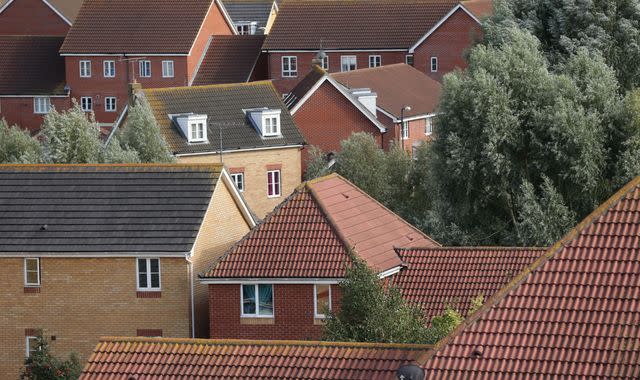Plans to build more homes in cities to be unveiled amid criticism from developers

Developers have accused the government of not doing enough to tackle falling levels of house building, as Michael Gove prepares to unveil plans that he says will boost construction - without spoiling the countryside.
In a speech expected on Monday, the levelling up and housing secretary will set out measures aimed at "unblocking the planning system" and increasing development in urban areas.
The prime minister has also announced that a manifesto promise to build one million new homes over this parliament will be met.
Government sources say a separate commitment to build 300,000 new homes per year by the mid-2020s still stands, despite a former Tory housing minister saying last May it would be missed "by a country mile".
Mandatory housebuilding targets for local authorities were dropped by ministers last year after a rebellion from Conservative MPs concerned about the impact of developments.
Rishi Sunak said the solution to the UK's housing shortage was not "concreting over the countryside".
He added: "Our plan is to build the right homes where there is the most need and where there is local support, in the heart of Britain's great cities… by regenerating disused brownfield land, streamlining planning process and helping homeowners to renovate and extend their houses outwards and upwards."
But the Home Builders Federation said the plans "do little to address the major reasons why housing supply is falling" and questioned if there was enough brownfield land available to meet demand.
Stewart Baseley, executive chairman of the group, said: "The increasingly anti-development policy environment is driving down housing supply, taking access to decent housing out of the reach in particular of young people, costing jobs and reducing economic activity.
"Much more decisive action is needed if government is serious about boosting housing delivery."
In a speech in central London tomorrow morning, Mr Gove is expected to lay out several proposals, including:
The creation of government-sponsored development corporations - modelled on a body set up by the Thatcher government in East London - with powers to buy up land using compulsory purchase orders and sell plots to developers.
A new 'super-squad' of planners and other experts to help unblock major developments. The team would initially be deployed to Cambridge to work on expansion plans.
The launch of a 'Planning Skills Delivery Fund' to clear backlogs and improve skills in the sector.
Higher fees levied on developers to help improve planning services.
New flexibilities to turn shops, takeaways and betting shops into homes and a cut in the administration required to convert barns and repurpose farm buildings.
A review of 'permitted development rights' to make it easier for the public to extend homes, convert lofts and renovate buildings.
Read more:
More shops could be converted into homes
Average asking rental price hit record high
Flooding forces flat residents out
The organisation representing local authorities criticised the government's plans for increased flexibility in planning laws though - saying property conversions should be handled through formal planning applications.
"Further expanding permitted development rights risks creating poor quality residential environments that negatively impact people's health and wellbeing, as well as a lack of affordable housing or suitable infrastructure," said chair of the Local Government Association, councillor Shaun Davies.
A report by the cross-party Levelling Up Committee earlier this month concluded the government was on track to deliver one million new homes over the course of this parliament, but said the dropping of mandatory targets would make it difficult to meet the annual aim of 300,000 additional properties.
Government figures show 687,000 new homes have been delivered since early 2019, reaching a high of 242,700 in the 12 months to April 2020.
But in May last year, former housing minister Robert Jenrick - who now serves in the Home Office - predicted that housebuilding would fall in the immediate future and that the 300,000 target would be missed "by a country mile".
Industry sources have also cast doubt on whether the government will hit its one million pledge, amid rising costs in the sector.
Housebuilders say the dropping of mandatory targets combined with the enforcement of pollution rules by Natural England has led to approved planning permissions falling to record lows.
The environmental watchdog has been accused by developers of blocking up to 145,000 homes because of so-called "nutrient neutrality rules" centred on the risk to waterways.
In an interview with the Sunday Telegraph, Mr Gove said ministers needed to work with Natural England to make sure the balance was right between building new homes and protecting the environment.
Ahead of his speech, Mr Gove said: "At the heart of this is making sure that we build beautiful and empower communities to have a say in the development in their area."
But Labour's shadow housing secretary Lisa Nandy said the Conservatives had failed to deliver enough new homes while in government.
She said: "It takes some serious brass neck for the Tories to make yet more promises when the housing crisis has gone from bad to worse on their watch, and when housebuilding is on course to hit its lowest rate since the Second World War because Rishi Sunak rolled over to his own MPs."

 Yahoo News
Yahoo News 
